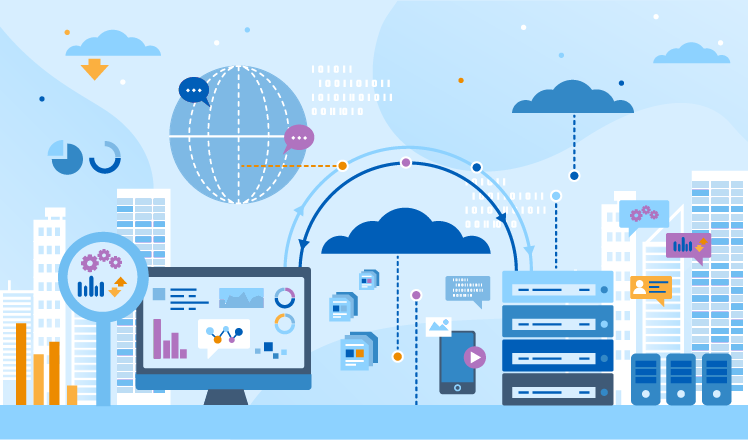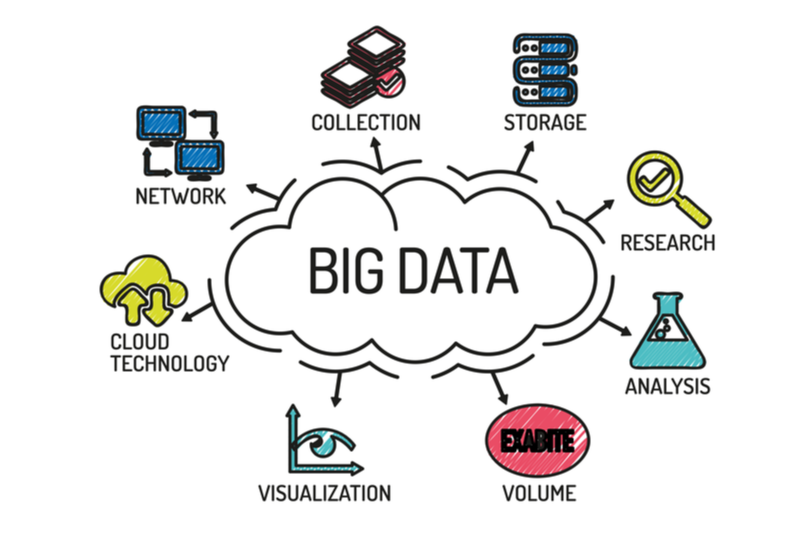Role of Big Data in Digital Marketing: Unveiling Targeted Result
November 21, 2023
Introduction
In today’s digital age, big data has emerged as a game-changer, revolutionizing various industries, including digital marketing. With the ability to collect, analyze, and interpret vast amounts of data, businesses can gain valuable insights into consumer behavior, preferences, and trends. This article explores the concept of big data, its impact on traditional digital marketing strategies, and how it has paved the way for more effective and targeted online marketing campaigns.
What is Big Data?
Big data refers to the massive volume of structured and unstructured data that is generated by individuals, organizations, and machines. This data is characterized by its velocity, variety, and volume, making it challenging to process using traditional data processing methods. However, with advancements in technology and the rise of sophisticated analytics tools, businesses can now harness the power of big data to gain valuable insights.

Traditional Digital Marketing Strategies
Before the advent of big data, digital marketing strategies were often based on assumptions and limited data. Marketers relied on demographic information, surveys, and market research to understand their target audience. While these methods provided some insights, they lacked the depth and accuracy that big data analytics can offer.

The Impact of Big Data on Digital Marketing
Big data has fundamentally reshaped the landscape of digital marketing, empowering businesses to tailor their strategies with unprecedented precision. By leveraging the vast amount of information available, marketers can gain a deeper understanding of their target audience, optimize content and social media strategies, and ultimately drive significant growth.
1. Target Aim: Understanding Customers Like Never Before
Traditionally, marketing relied on broad demographic data and assumptions about customer behavior. Big data analytics shatters these limitations, offering a granular view of individual preferences and online activities. Marketers can now:
- Identify and segment audiences: Analyze data from various sources like website visits, social media interactions, and purchase history to create highly targeted customer segments based on demographics, interests, and online behavior.
- Predict customer needs: Utilize sophisticated algorithms to anticipate customer needs and preferences, allowing for the development of personalized product recommendations, content suggestions, and marketing messages.
2. Sales: Optimizing the Customer Journey
Big data plays a crucial role in streamlining the sales funnel. By analyzing customer data, businesses can:
- Personalize the buying experience: Provide targeted product recommendations and offers based on individual preferences and purchase history, increasing the likelihood of conversions.
- Optimize pricing strategies: Analyze data on customer behavior and competitor pricing to set competitive pricing strategies that maximize profit margins.
- Identify and address purchase barriers: Utilize data to identify points in the customer journey where users drop off, allowing for targeted interventions and improvements to the buying experience.
3. Feedback Mechanism: Leveraging Customer Insights
Big data provides a powerful feedback mechanism, enabling businesses to continuously improve their marketing efforts. By analyzing data from various touchpoints, such as:
- Social media sentiment analysis: Understand customer perception of your brand and address any negative feedback promptly.
- Website clickstream analysis: Identify user behavior patterns on your website and optimize the user experience for better engagement and conversions.
- Campaign performance analysis: Track the effectiveness of different marketing campaigns and channels, allowing for real-time adjustments and resource allocation optimization.
4. Measuring Growth: Quantifying the Impact
Big data empowers marketers to move beyond anecdotal evidence and measure the true impact of their marketing efforts. By analyzing key metrics such as:
- Website traffic and conversion rates: Track the effectiveness of various marketing campaigns in driving traffic and conversions.
- Customer acquisition cost (CAC): Analyze the cost associated with acquiring new customers and optimize marketing spend for better return on investment (ROI).
- Brand awareness and reach: Utilize social media analytics and website traffic data to measure the effectiveness of campaigns in building brand awareness and reaching a wider audience.
Big data has transformed the way digital marketing strategies are developed and executed. By leveraging big data analytics, marketers can now gain a comprehensive understanding of their target audience, their preferences, and their online behavior. This wealth of information enables businesses to create highly personalized and targeted marketing campaigns like PPC for the ecommerce industry.
One area where big data has made a significant impact is in content marketing. With access to vast amounts of data, marketers can identify the type of content that resonates with their audience, the channels they prefer, and the optimal timing for engagement. This data-driven approach allows businesses to create compelling and relevant content that drives higher engagement and conversions.
Furthermore, big data has revolutionized social media marketing. Platforms like Facebook, Twitter, and Instagram generate enormous amounts of data every second. By analyzing this data, marketers can identify trends, sentiment, and consumer preferences, enabling them to tailor their social media campaigns for maximum impact.

Embracing Big Data for Digital Marketing Success
To leverage the power of big data in digital marketing, businesses need to adopt a data-driven mindset. This involves investing in advanced analytics tools like Microsoft Power BI & Google Analytics, hiring data scientists, and establishing robust data collection and storage systems. By integrating big data analytics into their digital marketing strategies, businesses can gain a competitive edge and drive better results.
Conclusion
In conclusion, big data has revolutionized the digital marketing landscape, empowering businesses to make data-driven decisions and create highly targeted campaigns. By harnessing the power of big data analytics, marketers can gain valuable insights into consumer behavior, preferences, and trends. This enables them to optimize their digital marketing strategies, drive higher engagement, and achieve better ROI.
Statistics:
– According to a report by Forbes, 64% marketers strongly believe data-driven marketing is crucial to success within a hypercompetitive global economy and 47% of believe that big data analytics has a number of tangible benefits realized form data-driven marketing.
– A report by McKinsey & Company states that businesses that leverage big data analytics in their marketing strategies are 23 times more likely to acquire customers.
Grow Your Business Today
Partner with Excellence Solutions for Comprehensive and Expert IT Services to Drive Substantial Business Growth





